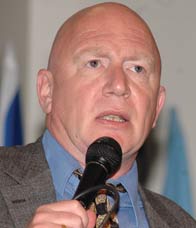|
Interview with Carlo Strenger on Midlife Crisis
February 2009 - By Dr. Nagendra V Chowdary
 Carlo Strenger
Carlo StrengerCarlo Strenger, Associate Professor at the psychology department of Tel Aviv University, a member of the institute of Existential Psychoanalysis, Zurich and of the Permanent Monitoring Panel on Terrorism of the World Federation of Scientist. 
-
What exactly do youmean by “existential
necessity” of midlife change?
The existential necessity is both internal
to the person’s psychology, i.e.,
the need for self-renewal, and it is
also the external necessity derived
from the fact that retirement is no
longer a financial option for most of
us. -
You have talked about two opposing
myths that underlie many
people’s fears about midlife, inhibiting
successful midlife change. Can
you please share with us what those
two opposing myths are?
|
|
The first myth is that of midlife as decline.
In our culture that tends to celebrate
youth, midlife is associated
with nothing but the loss of abilities
and opportunities – despite growing
evidence that mentally active people
becomemore capable rather than less.
Dismantling this myth is crucial, because
it prevents people from initiating
any new ventures, careers or activities,
as they feel that this is useless.
The second myth is that of magical
transformation: you can be anybody
you like, if you just want it enough.This myth is detrimental because it
makes realistic change seem trite
rather than exciting. Midlifers get lost
in fantasies of total, radical change,
and they don’t see that a realistic plan
for midlife changes needs to be evidence
based. At midlife we have a lot
of evidence aboutwhatwe are good at
and what we like, and this is what we
should base our second lifecycle on. While many have talked about
midlife crisis, you have observed,
“midlife is exciting because it is a time
when people have the opportunity to
reexamine even their most basic assumptions.”
What is the basis of this
argument?
The reason midlife is exciting is that
we have so much more self-knowledge
and experience than we ever
had, and at the same time still have
our full abilities. For many of us this
is the opportunity to move on to do
something that is more deeply meaningful
to us. After all, in our twenties
we make choices without knowing
much either about ourselves or about
the world, so this is a great opportunity
for a “Life-Take2”! We often forget that in youth we are
far less free in making decisions than
we are at midlife. We depend on external
authorities, like parents, and
we are under much more pressure to
live up to social norms and expectations.
In psychology we call the process
of becoming more self-reliant individuation,
and midlife can be an
important step towards this goal. Therefore, what are the advantages
of midlife?
Themajor advantage ofmidlife is selfknowledge,
as I just said. In early life
we are somuch more preoccupied by
social norms and the expectations of
our environment – and we have little
life-experience. Add to this that most
of us are bound to know much more
about the world, and we also have
plenty of connections we didn’t have
in early life. Hence there are good reasons
to believe that we will be able to
make a difference both to ourselves
and to the world by judiciously
choosing our second life-cycle. What is the risk of not managing
midlife?
The major risk is that of burnout; we
may cling to what we do for too long
and simply find that we’re tiring out.
The other big risk is that if we wait
too long, we may find ourselves in
difficult situations (like organizations
breathing down our neck to leave, or
to be out of a job) relatively late in life,
without having built a toolbox
needed for our second lifecycle. As in most fields of life, being proactive
is better than being reactive. Our
suggestion is not to wait until we are
in trouble.We believe that thinking in
two lifecycles should become a cultural
norm; it should become amatter
of course that people in their forties
talk to each other aboutwhat theywill
do with their second lifecycle rather
than waiting until the trouble has already
set in. Is there any difference between the
midlife change that a corporate executive
goes through and others (an entrepreneur,
a politician, a civil servant,
a secret service agent, an artist, a
sports person, etc) go through? What
are the unique features of a corporate
executive’s midlife change?
Corporate careers are strongly defined
by the ever narrowing pyramids of
corporate structures. Hence many executives
atmidlife are bound to know
that they will not make it to the top.
This is often a painful realization, but
it is better to be clear headed about
one’s future prospects instead of waiting
for reality to make us realize what
we don’t want to see. In addition corporate careers are defined
by the perks and the status symbols
that are very difficult to renounce.
This makes it more difficult
for corporate executives to realize that
it’s time to move on, and to leave the
comforts of the present position behind
before the corporation willmake
us leave without preparation.
1.
Walt Disney's Corporate Governance Crisis Case Study
2. ICMR
Case Collection
3.
Case Study Volumes
|
